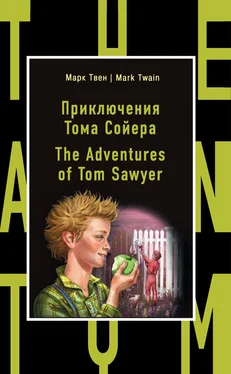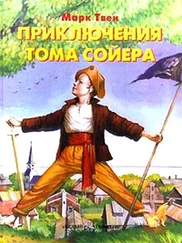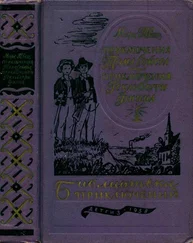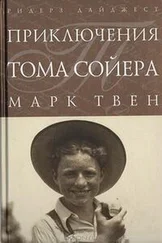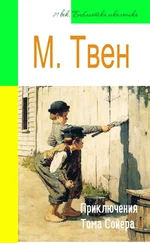And he went through the motions of thrashing an imaginary boy – pummelling the air, and kicking and gouging. ‘Oh, you do, do you? You holler ’nough, do you? Now, then, let that learn you!’ And so the imaginary flogging was finished to his satisfaction.
Tom fled home at noon. His conscience could not endure any more of Amy’s grateful happiness, and his jealousy could bear no more of the other distress. Becky resumed her picture inspections with Alfred, but as the minutes dragged along and no Tom came to suffer, her triumph began to cloud and she lost interest; gravity and absent-mindedness followed, and then melancholy; two or three times she pricked up her ear at a footstep, but it was a false hope; no Tom came. At last she grew entirely miserable and wished she hadn’t carried it so far. When poor Alfred, seeing that he was losing her, he did not know how, kept exclaiming: ‘Oh, here’s a jolly one! look at this!’ she lost patience at last, and said, ‘Oh, don’t bother me! I don’t care for them!’ and burst into tears, and got up and walked away.
Alfred dropped alongside and was going to try to comfort her, but she said:
‘Go away and leave me alone, can’t you! I hate you!’
So the boy halted, wondering what he could have done – for she had said she would look at pictures all through the nooning – and she walked on, crying. Then Alfred went musing into the deserted schoolhouse. He was humiliated and angry. He easily guessed his way to the truth – the girl had simply made a convenience of him to vent her spite upon Tom Sawyer. He was far from hating Tom the less when this thought occurred to him. He wished there was some way to get that boy into trouble without much risk to himself. Tom’s spelling-book fell under his eye. Here was his opportunity. He gratefully opened to the lesson for the afternoon and poured ink upon the page.
Becky, glancing in at a window behind him at the moment, saw the act, and moved on, without discovering herself. She started homeward, now, intending to find Tom and tell him; Tom would be thankful and their troubles would be healed. Before she was half way home, however, she had changed her mind. The thought of Tom’s treatment of her when she was talking about her picnic came scorching back and filled her with shame. She resolved to let him get whipped on the damaged spelling-book’s account, and to hate him forever, into the bargain.
Tom arrived at home in a dreary mood, and the first thing his aunt said to him showed him that he had brought his sorrows to an unpromising market: ‘Tom, I’ve a notion to skin you alive!’
‘Auntie, what have I done?’
‘Well, you’ve done enough. Here I go over to Sereny Harper, like an old softy, expecting I’m going to make her believe all that rubbage about that dream, when lo and behold [71] Lo and behold – выражение удивления, когда кто-то или что-то внезапно появляется.
you she’d found out from Joe that you was over here and heard all the talk we had that night. Tom, I don’t know what is to become of a boy that will act like that. It makes me feel so bad to think you could let me go to Sereny Harper and make such a fool of myself and never say a word.’
This was a new aspect of the thing. His smartness of the morning had seemed to Tom a good joke before, and very ingenious. It merely looked mean and shabby now. He hung his head and could not think of anything to say for a moment. Then he said:
‘Auntie, I wish I hadn’t done it – but I didn’t think.’
‘Oh, child, you never think. You never think of anything but your own selfishness. You could think to come all the way over here from Jackson’s Island in the night to laugh at our troubles, and you could think to fool me with a lie about a dream; but you couldn’t ever think to pity us and save us from sorrow.’
‘Auntie, I know now it was mean, but I didn’t mean to be mean. I didn’t, honest. And besides, I didn’t come over here to laugh at you that night.’
‘What did you come for, then?’
‘It was to tell you not to be uneasy about us, because we hadn’t got drownded.’
‘Tom, Tom, I would be the thankfullest soul in this world if I could believe you ever had as good a thought as that, but you know you never did – and I know it, Tom.’
‘Indeed and ’deed I did, auntie – I wish I may never stir if I didn’t.’
‘Oh, Tom, don’t lie – don’t do it. It only makes things a hundred times worse.’
‘It ain’t a lie, auntie; it’s the truth. I wanted to keep you from grieving – that was all that made me come.’
‘I’d give the whole world to believe that – it would cover up a power of sins, Tom. I’d ‘most be glad you’d run off and acted so bad. But it ain’t reasonable; because, why didn’t you tell me, child?’
‘Why, you see, when you got to talking about the funeral, I just got all full of the idea of our coming and hiding in the church, and I couldn’t somehow bear to spoil it. So I just put the bark back in my pocket and kept mum.’
‘What bark?’
‘The bark I had wrote on to tell you we’d gone pirating. I wish, now, you’d waked up when I kissed you – I do, honest.’
The hard lines in his aunt’s face relaxed and a sudden tenderness dawned in her eyes.
‘DID you kiss me, Tom?’
‘Why, yes, I did.’
‘Are you sure you did, Tom?’
‘Why, yes, I did, auntie – certain sure.’
‘What did you kiss me for, Tom?’
‘Because I loved you so, and you laid there moaning and I was so sorry.’
The words sounded like truth. The old lady could not hide a tremor in her voice when she said:
‘Kiss me again, Tom! – and be off with you to school, now, and don’t bother me any more.’
The moment he was gone, she ran to a closet and got out the ruin of a jacket which Tom had gone pirating in. Then she stopped, with it in her hand, and said to herself:
‘No, I don’t dare. Poor boy, I reckon he’s lied about it – but it’s a blessed, blessed lie, there’s such a comfort come from it. I hope the Lord – I KNOW the Lord will forgive him, because it was such goodheartedness in him to tell it. But I don’t want to find out it’s a lie. I won’t look.’
She put the jacket away, and stood by musing a minute. Twice she put out her hand to take the garment again, and twice she refrained. Once more she ventured, and this time she fortified herself with the thought: ‘It’s a good lie – it’s a good lie – I won’t let it grieve me.’ So she sought the jacket pocket. A moment later she was reading Tom’s piece of bark through flowing tears and saying: ‘I could forgive the boy, now, if he’d committed a million sins!’
There was something about Aunt Polly’s manner, when she kissed Tom, that swept away his low spirits and made him lighthearted and happy again. He started to school and had the luck of coming upon Becky Thatcher at the head of Meadow Lane. His mood always determined his manner. Without a moment’s hesitation he ran to her and said:
‘I acted mighty mean to-day, Becky, and I’m so sorry. I won’t ever, ever do that way again, as long as ever I live – please make up, won’t you?’
The girl stopped and looked him scornfully in the face: ‘I’ll thank you to keep yourself TO yourself, Mr. Thomas Sawyer. I’ll never speak to you again.’
She tossed her head and passed on. Tom was so stunned that he had not even presence of mind enough to say ‘Who cares, Miss Smarty?’ until the right time to say it had gone by. So he said nothing. But he was in a fine rage, nevertheless. He moped into the schoolyard wishing she were a boy, and imagining how he would trounce her if she were. He presently encountered her and delivered a stinging remark as he passed. She hurled one in return, and the angry breach was complete. It seemed to Becky, in her hot resentment, that she could hardly wait for school to ‘take in,’ she was so impatient to see Tom flogged for the injured spelling-book. If she had had any lingering notion of exposing Alfred Temple, Tom’s offensive fling had driven it entirely away.
Читать дальше
Конец ознакомительного отрывка
Купить книгу
